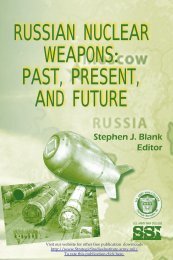The United States and China in Power Transition - Strategic Studies ...
The United States and China in Power Transition - Strategic Studies ...
The United States and China in Power Transition - Strategic Studies ...
You also want an ePaper? Increase the reach of your titles
YUMPU automatically turns print PDFs into web optimized ePapers that Google loves.
ponents to U.S.-<strong>Ch<strong>in</strong>a</strong> military-to-military contacts<br />
suggest that the <strong>United</strong> <strong>States</strong> should limit these exchanges<br />
to high-level strategic dialogues, <strong>and</strong> keep<br />
the PLA out of touch with the U.S. military at the operational<br />
level. <strong>The</strong> <strong>United</strong> <strong>States</strong> would be better off<br />
keep<strong>in</strong>g its military superiority over <strong>Ch<strong>in</strong>a</strong> <strong>and</strong> focus<br />
on measures that will ensure the safety of U.S. military<br />
<strong>in</strong> the Western Pacific, even if meant to st<strong>and</strong> firm<br />
on <strong>Ch<strong>in</strong>a</strong>’s military challenges. 232<br />
<strong>The</strong> Ch<strong>in</strong>ese, however, have an entirely different<br />
take on U.S.-<strong>Ch<strong>in</strong>a</strong> military relations. <strong>The</strong>y hold the<br />
follow<strong>in</strong>g views: 233<br />
• <strong>The</strong> most fundamental problem <strong>in</strong> the U.S.-<br />
<strong>Ch<strong>in</strong>a</strong> military-to-military relationship is the<br />
lack of trust between the two nations. Without<br />
this trust, this relationship is not susta<strong>in</strong>able.<br />
• <strong>Ch<strong>in</strong>a</strong> blames the <strong>United</strong> <strong>States</strong> for its cont<strong>in</strong>ued<br />
perception of <strong>Ch<strong>in</strong>a</strong> as an enemy. With its<br />
antagonistic view, the <strong>United</strong> <strong>States</strong> takes every<br />
development <strong>in</strong> <strong>Ch<strong>in</strong>a</strong> as a threat. Particularly,<br />
the <strong>United</strong> <strong>States</strong> never respects <strong>Ch<strong>in</strong>a</strong>’s rightful<br />
need to modernize its military power.<br />
• <strong>The</strong> Ch<strong>in</strong>ese ma<strong>in</strong>ta<strong>in</strong> that they have a consistent<br />
<strong>and</strong> pragmatic view of its relationship with<br />
the <strong>United</strong> <strong>States</strong>: it is neither a friend nor an enemy<br />
(非友非敌). <strong>Ch<strong>in</strong>a</strong> accepts that it will never<br />
become an allied friend to the <strong>United</strong> <strong>States</strong>, but<br />
it can try to avoid becom<strong>in</strong>g a deadly enemy.<br />
<strong>Ch<strong>in</strong>a</strong> holds its relationship with the <strong>United</strong><br />
<strong>States</strong> as the most important one among its key<br />
foreign relations (重中之重) <strong>and</strong> will do everyth<strong>in</strong>g<br />
possible to preserve this relationship. <strong>The</strong><br />
Ch<strong>in</strong>ese argue that the <strong>United</strong> <strong>States</strong> has an ambivalent<br />
attitude toward <strong>Ch<strong>in</strong>a</strong>; <strong>and</strong> U.S. policy<br />
toward <strong>Ch<strong>in</strong>a</strong> has vacillated between engage-<br />
196

















